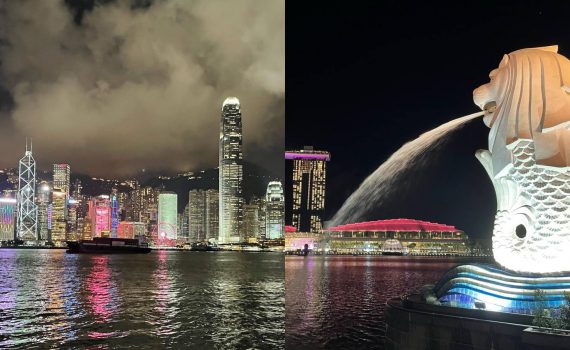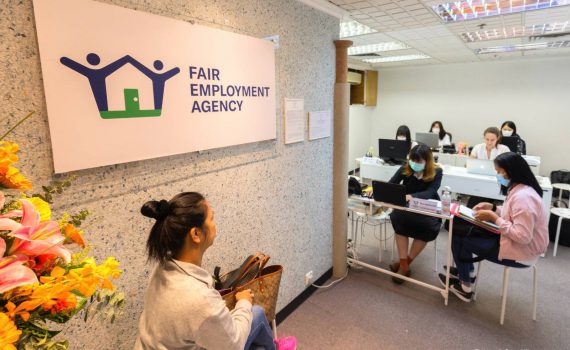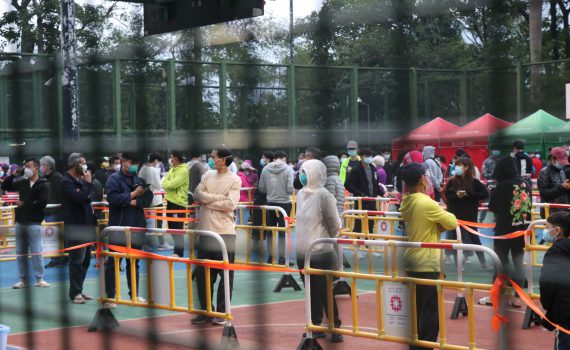Society
Budget 2022: How do Singapore and Hong Kong’s pandemic relief measures for the hardest hit compare?
- 2022-02-23
- Society
- The Young Reporter
- By: Nick YangEdited by: Kate Zhang
- 2022-02-23
Singapore and Hong Kong, two small and open Asian economies that are often compared, have adopted completely different COVID-19 policies. Singapore has moved to "living with COVID-19" while Hong Kong sticks to China’s "dynamic zero COVID" strategy. But the effects of the pandemic have not been equal, and both cities have implemented financial relief for the hardest hit. With the Hong Kong government announcing its 2022-23 budget today and the Singapore government delivering its 2022 Budget Plan last Friday, The Young Reporter explains five ways both Singapore and Hong Kong have attempted to alleviate COVID-19’s impact on its neediest residents. 1. Tax Relief Tax redistribution is a way to cope with inequality in many countries, according to the United Nations, as poor households are often affected more. Singapore: Consumption taxes tend to be regressive, meaning they are disproportionately difficult on low earners, economists say. The Singapore government suspended its plan to raise the goods and services tax from 7% to 9% in 2021, a broad-based consumption tax on nearly all supplies of goods and services in Singapore. It is expected to be raised in 2023. This year, a S$560 million ( HK$3.25 billion) Household Support Package, which provides support for daily essentials through utilities rebates, top-ups for children’s education and vouchers for use at heartland shops, will be provided to support households, especially poor families, in dealing with a future hike in the GST. The Singapore government also provided tax relief for the self-employed and low-income workers with pandemic-driven support schemes, including the Self-Employed Person Income Relief Scheme and Workfare Special Payment. Hong Kong: The government has waived a portion of employment taxes for three years, including salaries tax and tax under personal assessment reduction, with a ceiling of HK$10,000 this year and last year, and HK$20,000 in 2020. For …
Australia reopens to vaccinated travellers, while Hongkongers struggle with quarantine
- 2022-02-21
- Society
- The Young Reporter
- By: Hamish CHANEdited by: Clarice Wu
- 2022-02-21
After 704 days, Australia finally reopens its international border to fully vaccinated travellers, except for Western Australia, its border is scheduled to reopen on March 3. At least two jabs of vaccines are required to visit Australia. To visit State Victoria, travellers must be vaccinated with a booster on top of the two doses. Unvaccinated travellers with medical proof of not being suitable for vaccination may need to quarantine for 14 days, while the vaccinated do not need to undergo quarantine. There will be 56 international flights landing in Australia today worldwide, including Hong Kong. “My message to tourists all around the world is: ‘Pack your bags and come and have one of the great experiences you could ever imagine,” said Australian Prime Minister Scott Morrison. “Don’t forget to bring your money with you because you will find plenty of places to spend it’,” he added. Karla Warner, the manager of Queensland Museum Shop, said she is excited to see visitors returning to Australia. “Finally, we can have international visitors after two years,” said Warner. She expects that more visitors will go to the museum and grab souvenirs, which can boost the shop's sales. “I am optimistic with the sales,” said Warner. She expects that visitors will bring new energy to the economy which has been affected by the pandemic. However, potential visitors from Hong Kong are struggling with the local quarantine policy. Li Chi-chung, said he wants to meet his son, who is studying in Melbourne, but the quarantine policy in Hong Kong stops him. “I want to see my son face-to-face, but I do not want to spend a month in quarantine when I come back from Australia,” said Li over the phone. Currently, Australia is one of the listed countries with flight suspension in Hong Kong. Travellers …
Employment agency kicks off four-day work week in Hong Kong
- 2022-02-21
- Society
- The Young Reporter
- By: Malick GaiEdited by: Karmen Li
- 2022-02-21
The Fair Employment Agency has started a six-month trial of a four-day work week on Feb. 14, the first foreign domestic helper employment agency in Hong Kong to start such a work model. Employees at the agency now work 36 hours in the new work week, down from around 45 hours. They will still be doing the same work with the same monthly pay, with eight to nine working hours each day. "With the new work model, we can provide better services to meet the needs of our foreign domestic helper and employer clients," said Grace Cheng, General Manager of Fair Employment Agency, a non-profit social business that recruits and matches domestic helpers with employers. According to the latest labour data published by the Census and Statistics Department, 14.7% of the city's employed persons work 60 hours and above, while 13.7% work less than 35 hours. The agency, founded by Fair Employment Foundation in 2014, has processed more than 6,000 domestic helper visas, mostly women from the Philippines and Indonesia, with no fees for the person being hired. Its mission is to eliminate the abuse and mistreatment against migrant domestic workers, by professionalizing the industry as a whole. It has more than 20 full-time staff. “In order to disrupt this industry, we need to hire talented people who are motivated by more than just a paycheck. So we decided to focus on giving our employees what they want. With an extra day off, our team can focus their work time on providing awesome service to our customers. Ultimately, this is how the industry will be transformed,” Cheng said. Hong Kong is known for its long work hours, but a four-day week is gaining momentum globally. In August 2019, Microsoft in Japan started a four-day work week, which found that productivity …
Government tells fundraisers to stop financial aid for foreign domestic helpers fined for breaking social distancing rules
- 2022-02-20
- Society
- The Young Reporter
- By: Karmen LiEdited by: Tracy Leung
- 2022-02-20
The government warned people who joined in fundraising activities to help foreign domestic workers pay a government fine are committing a crime. Seventeen foreign domestic helpers were fined HK$5,000 each last weekend for violating the social distancing rule that limits public gatherings to two people, according to the government press release. In response, netizens set up an online fundraising platform for the domestic workers. “We will ask for legal advice to stop such fundraising activities,” said Law Chi-kwong, the secretary for Labour and Welfare in a radio program yesterday. “Fundraising is encouraging the domestic workers to gather and not be afraid of being fined, which is maliciously damaging our anti-epidemic works.” The fine is more than the HK$4,630 minimum monthly wage for domestic workers. “There will be rigorous enforcement action against foreign domestic workers who violate the two-person social gathering limit this weekend,” said Law. Helping Helpers, the fund organiser, said they suspended the fundraising. The received donations will be returned to the donors through the fundraising platform, and they will not pay the fines for the 17 domestic workers, according to the updates on the webpage. Chief executive Carrie Lam Cheng Yuet-ngor said in a press conference that employers should ask their domestic helpers to stay home during weekends. She said the enforcement officers would show “no mercy” to anyone breaching the social distancing rule. The government announced the tightening of social distancing measures on Feb. 8 under the fifth wave of pandemic in Hong Kong. Public gatherings of more than two people from two different families are banned. A maximum penalty for breaching the social-distancing rule will be charged a fine of $25,000 and up to six months prison. Law said employers can pay the domestic helpers to stay home on public holidays if the helpers are willing, …
Lantern Festival with no fanfare
- 2022-02-16
- Society
- The Young Reporter
- By: Leona LiuEdited by: Kate Zhang
- 2022-02-16
Lunar New Year lantern festivities are cancelled in Hong Kong for a third year because of the fifth wave of Covid-19. Traditionally, the Lantern Festival is celebrated on the first full moon after Lunar New Year. It marks the end of the New Year celebrations and is also known as Chinese Valentine's Day. But Covid restrictions have forced cancellation of carnivals that used to be held in public parks in Hong Kong. Ng Jing-yi, a mother of four, used to invite her relatives and friends over for dinner and would take her children to the Lantern Festival carnival. However, this year she only plans to celebrate the last day of the Lunar New Year by cooking some frozen rice dumplings at home. “When there was no epidemic, the lantern carnivals in Tsim Sha Tsui were always crowded with people who talked and laughed in a festive atmosphere. But now the increasing number of new cases makes me anxious and I just want to stay at home,” Ms.Ng said. Li Zishuo, a mainland student in his junior year at the University of Hong Kong, said this was his third Lunar New Year in Hong Kong, but he never felt the lively festival atmosphere that he heard of before the pandemic. “Before I came to Hong Kong for university, I heard that the Lunar New Year celebrations here are unique, especially the Lantern Festival carnival. Unfortunately, since 2020 the activities have been cancelled because of the coronavirus,” he said. Hong Kong on Tuesday reported 1,619 new confirmed cases and another 5,400 preliminary positive cases of Covid. “As far as Hong Kong is concerned, we need to find our own way out of this epidemic, and so far, our measures to contain the spread of the disease remains a legitimate and valid one. …
One last haircut and worship before toughened Covid rules
- 2022-02-10
- Society
- The Young Reporter
- By: Lokman YuenEdited by: Phoebe Law、Jayde Cheung
- 2022-02-10
As Covid cases in the city hit record high, religious premises and hair salon are required to close for two weeks starting from Thursday. Citizens rushed to barber shops and temples today, seized the final opportunity for a nice haircut and good fortune.
Hongkongers flock to Sai Kung during Chinese New Year
- 2022-02-07
- Society
- The Young Reporter
- By: Malick GaiEdited by: Kylie Wong
- 2022-02-07
Every weekend, Sang Poon plays saxophone at the Sai Kung waterfront. Poon used to work in a bar playing jazz and pop music, but lost his job during the pandemic and turned to busking. He says Sai Kung is a hotspot for visitors. “I love the view here. I have fun playing music and I get to make some money," said Sang Poon. Despite Hong Kong encountering the largest Covid-19 wave of the pandemic, residents are flocking to Sai Kung as travel restrictions kept most home for the Lunar New Year. "It's been busy for the past week. Business is okay because of the Chinese New Year holidays. It is especially busy on Sundays," said Tim Fung, a staff member at the Chuen Kee seafood restaurant in Sai Kung. Sai Kung has become a preferred destination for Hongkoners looking to sightsee, hike and eat as well as escaping the busy city. "There's beautiful scenery here with a relaxed atmosphere. It's really a nice holiday vibe and we enjoy it," said Kathryn Troy and Stephen Troy, a couple walking with their 15-month old daughter. The Troys live in nearby Sha Kok Mei village and visit the waterfront regularly. While seafood restaurants at the waterfront hustle, nearby grocery shops closer to Sai Kung square are not as busy. Timothy Ng owns Butcher King, a fresh vegetable and meat store on Yi Chun street, which has been operating for 31 years. “The last two to three years have been the hardest because of the pandemic," said Ng.
Shortened quarantine for inbound travellers from high-risk countries
- 2022-02-05
- Society
- The Young Reporter
- By: Kate ZhangEdited by: Nick Yang
- 2022-02-05
From today, inbound travellers from high-risk countries will need to be quarantined in a hotel for 14 days instead of 21 days. They then have to self-monitor at home an additional seven days. The rules applies to all places outside mainland China, Taiwan and Macau. But the flight ban for eight countries will be extended until February 18 to avoid imported cases and pressure on the local medical system. Under the new quarantine policy, inbound travellers can go out during the home quarantine period, but they have to undergo two mandatory tests on the 16th and 19th days after their arrival in Hong Kong. “The revision from 21-day hotel quarantine to 14-day hotel quarantine plus seven-day self-monitoring is not because of pressure from anybody,” chief executive Carrie Lam Cheng Yuet-ngor said last week. “The science tells us that Omicron variant has a relatively short incubation period. So a 14-day quarantine will be good enough according to my experts.” An infectious disease expert agrees with the science behind this change. "If we compare imported cases detected in the last month versus imported cases detected earlier in the epidemic, there are now very few if any cases detected after the third day of hotel quarantine," said Professor Benjamin Cowling, the head of the Division of Epidemiology and Biostatistics at the University of Hong Kong. Kong Shasha, 24, an exchange student studying in Italy, will return to Hong Kong tomorrow. If the mandatory quarantine period is still 21 days, she would prefer to stay in Italy. "I cannot accept being isolated for 21 days, and this revision in policy has helped me a lot," said Kong. However, some in the business community want more to be done. "It will help the local business community if they want to do outbound business travel because …
Covid lockdown in Kwai Chung leaves residents in the lurch
- 2022-01-25
- Society
- The Young Reporter
- By: Karmen LiEdited by: Jayde Cheung、Jenny Lam
- 2022-01-25
Students learn together on Instagram as Covid-19 gets worse
- 2022-01-24
- Society
- The Young Reporter
- By: Gigi ChongEdited by: Tiffany Ma
- 2022-01-24
The candidates of 2022 Hong Kong Diploma of Secondary Education maintain their burning ambition to study by posting under #2022dsestudygram, a trending hashtag that has gained over 6,000 posts on Instagram. “Studygram makes me more concentrated on my studies during the class suspension period when I see how hard others study though their Studygram,” said Cindy Lam Pui-yin, a DSE candidate taking Physics and Economics as elective subjects, on top of the four compulsory subjects including Chinese, English, Mathematics and Liberal Studies. “The future depends on what you do today,” is one of the inspiring quotes captured by the student-managed Studygrams, where pupils keep a record of their study progress in Instagram accounts, to encourage peers amid class suspension due to rapid spread of Covid-19. The Education Bureau announced that all schools must hold classes online only on Jan.20, but schools can arrange in-person half-day lessons for form six students to prepare for the final examinations. Examinations and student activities in other levels should halt and postpone, according to the announcement. Although online lessons save travelling time and give students more autonomy in learning, Lam worries that the sudden amendment will affect her performance in the public exam. “We haven’t been taught the full curriculum for some elective subjects yet, and the class suspension is having an impact on my preparation for the public exam,” said Lam. Michelle Lam, also a candidate for the examination, owns a studygram with over 700 followers, said that online teaching always distracts her from focusing on the lessons. “I don’t dare to relax when I see so many people study hard even though the in-person classes are suspended,” Lam said. The 2022 DSE will start on Apr. 22 while the class suspension lasts until Chinese New Year holidays.










